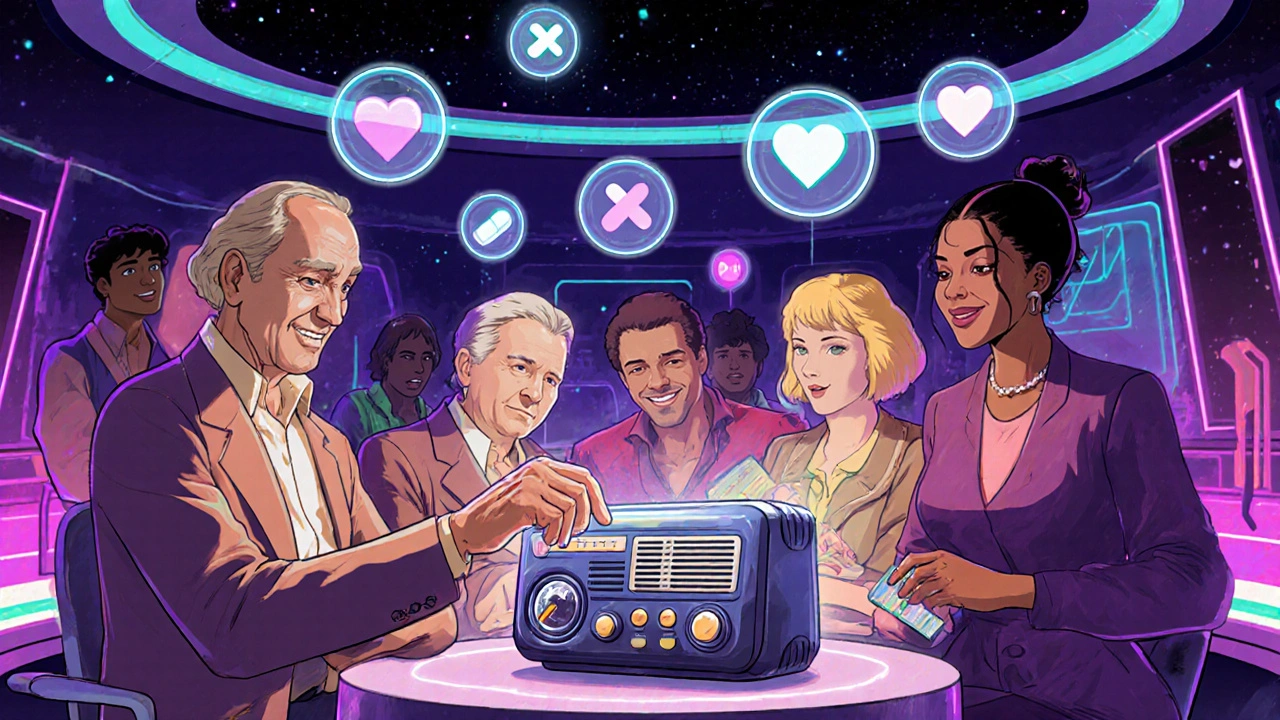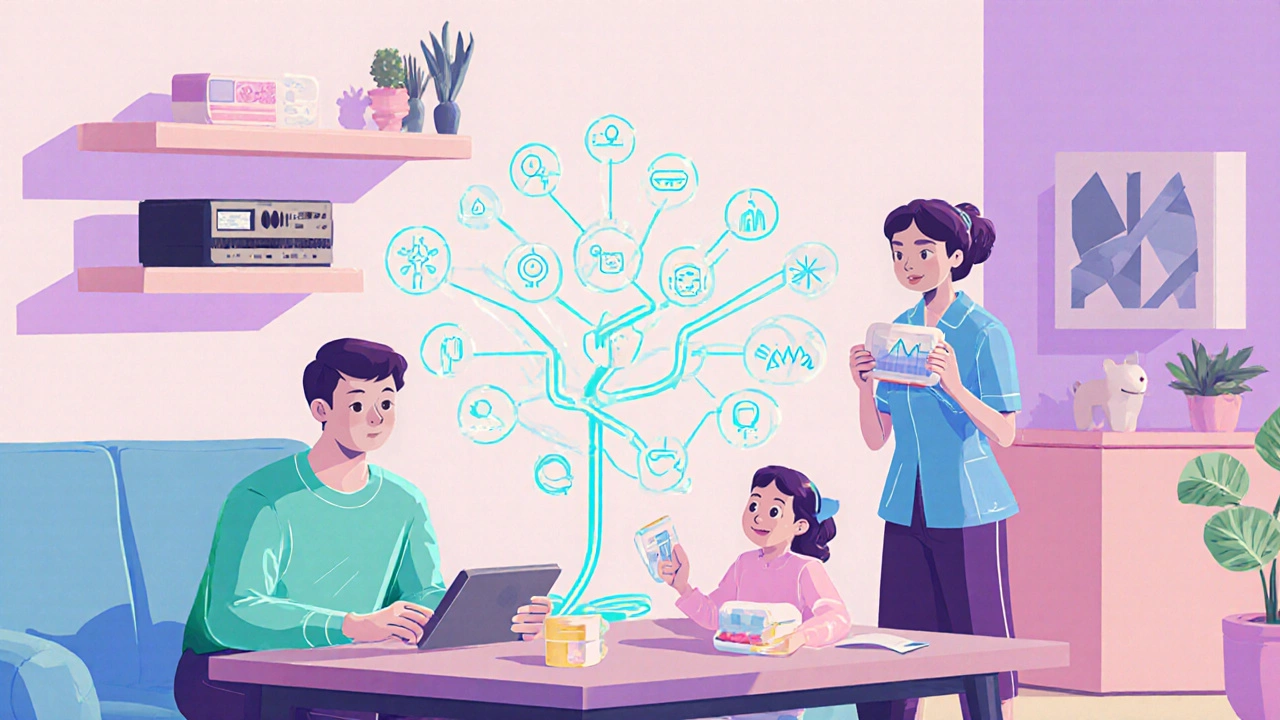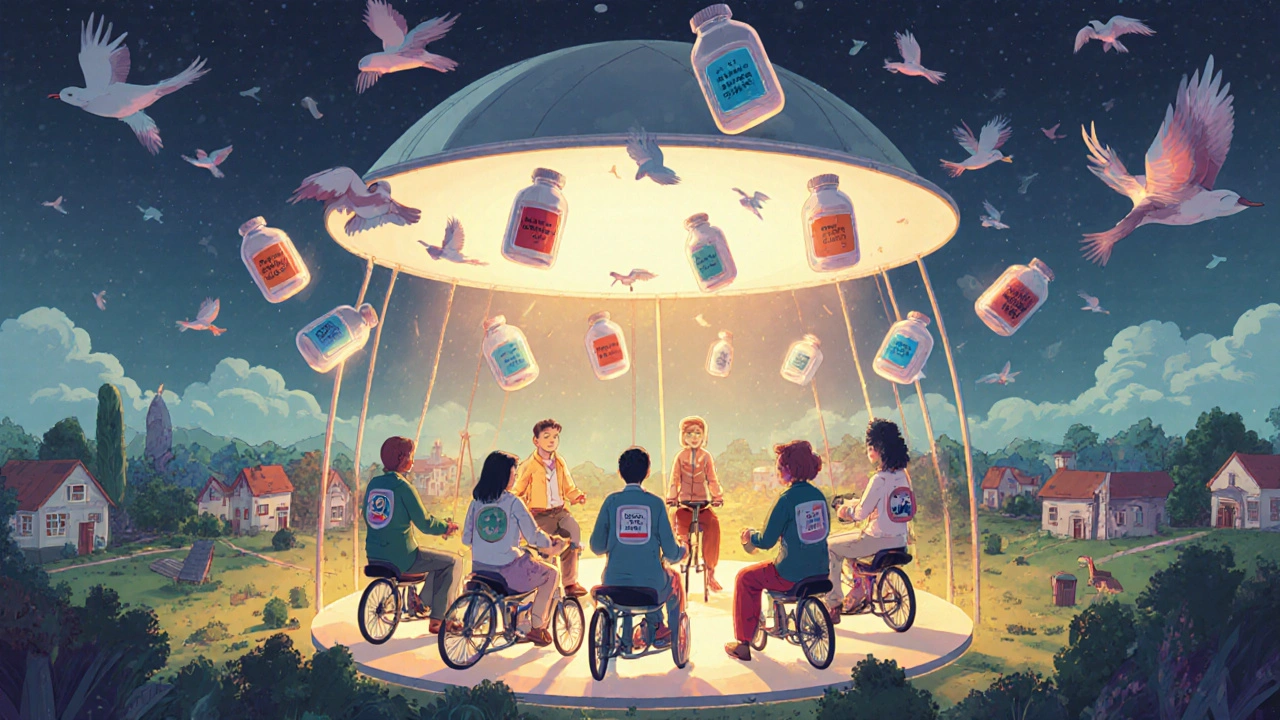How Support Groups and Community Programs Improve Medication Compliance

More than half of people with chronic illnesses miss doses, skip refills, or stop taking their meds altogether. It’s not laziness. It’s not ignorance. It’s loneliness, confusion, fear, and the sheer weight of managing multiple pills every day. The World Health Organization says medication non-adherence costs the U.S. healthcare system between $100 billion and $300 billion a year. But there’s a powerful, low-tech solution that’s working better than any app or reminder system: support groups and community programs for medication compliance.
Why People Stop Taking Their Medication
It’s easy to assume people forget their pills. But the real reasons are deeper. Side effects like dizziness or nausea make some patients feel worse than they did before. Others can’t afford the co-pays. Some don’t believe the medicine works. And many just feel isolated-like they’re the only one struggling with this daily routine. A 2023 study in Frontiers in Pharmacology found that people who felt alone in their health journey were 3 times more likely to miss doses. That’s where support groups step in. They don’t just remind you to take your pill. They remind you that you’re not alone.How Peer Support Actually Works
Peer-led support groups are different from doctor’s office lectures. In these groups, people who’ve been where you are now lead the conversation. They’ve managed diabetes for five years. They’ve survived heart failure. They’ve dealt with depression while on antidepressants. They’ve figured out how to fit five pills into a busy workday without getting fired. These groups meet weekly or biweekly, usually with 8 to 12 people. Facilitators aren’t doctors-they’re trained volunteers who’ve completed at least 40 hours of certification. They don’t give medical advice. They ask questions: “What was your hardest week with this med?” “How did you handle the nausea?” “Did you ever skip a dose because you were embarrassed?” One participant on Reddit’s r/ChronicIllness shared that after joining a weekly diabetes group, her missed doses dropped from 3-4 per week to less than one. Her A1c fell from 8.5% to 6.9% in six months. That’s not magic. That’s shared experience.Types of Programs That Work
Not all support programs are the same. Here are the three most effective models:- Community health worker visits: Trained local workers come to your home 4 to 12 times over 3 to 6 months. They check your pill bottles, help you set up pill organizers, and walk you through your schedule. These are especially effective for older adults and those with mobility issues.
- Hospital-based peer groups: Often held in clinics or community centers, these groups combine peer stories with brief check-ins from pharmacists or nurses. The American Heart Association’s Heart360 program pairs patients with peer mentors who’ve managed heart disease for at least two years.
- Digital peer platforms: Apps like PatientsLikeMe connect people with the same condition. Over 78% of users reported better adherence after joining. But here’s the catch: apps alone don’t reduce hospital visits. Only face-to-face groups do.
The Power of Family and Culture
Family involvement makes a huge difference. A 2021 review of 14 studies found that when spouses, children, or parents helped manage meds, adherence jumped by 20-30%. One woman in Texas started taking her husband’s blood pressure pills with him every morning. “We turned it into our ritual,” she said. “Now we both feel better.” Culture matters too. A 2022 study in BMC Health Services Research found African American participants in hypertension groups were 35% more likely to stick with treatment when the group was led by someone from the same background. Language, food, humor, even the way people talk about illness-all of it shapes trust. Yet only 22% of U.S. programs offer materials in languages other than English, even though 25% of Americans have limited English proficiency. That’s a gap we can’t ignore.
Why Some Programs Fail
Not every support group works. Many fail because they treat adherence like a knowledge problem: “Just tell them why it’s important.” But knowledge doesn’t change behavior. Connection does. Programs that only hand out brochures or run one-time workshops see almost no improvement. A 2022 study in the American Journal of Managed Care found that groups with facilitators trained for less than 20 hours were 37% less effective than those with 40+ hours of training. Other common problems:- Scheduling conflicts (42% of participants drop out because meetings don’t fit their lives)
- Lack of professional oversight (27% worry no one is checking if meds are safe)
- Too much focus on education, not enough on real-life problem-solving
What Makes a Program Effective
The most successful programs don’t just talk. They do. They use:- Active listening (required by 92% of top programs)
- Medication knowledge (87% of facilitators can explain side effects and interactions)
- Cultural competency (79% train staff to understand race, religion, and language barriers)
- Multiple behavior-change tools (effective programs use an average of 4.7 techniques: reminders, rewards, goal-setting, social accountability)
Who’s Doing It Right
The Veterans Health Administration runs peer support programs in 140 facilities, serving 250,000 veterans yearly. Kaiser Permanente has 147 condition-specific groups. Both report 15-30% fewer hospital readmissions. Medicare Advantage plans now include adherence support in 63% of their 2023 offerings. The CDC’s 2022 guide recommends a 6-month rollout: 3 months to train staff, 2 months to test with a small group, then refine before going live. And the ROI? A 2022 JAMA Network Open study found a diabetes support program saved $18 for every $1 spent by cutting hospitalizations by 27% in one year.
Where the Gaps Are
Rural areas are left behind. A 2022 study in Rural and Remote Health found participation rates in small towns are 32% lower than in cities. Fewer people. Fewer resources. Fewer programs. Nonprofits struggle to stay funded. A 2023 survey found 41% of community programs are financially unstable. They rely on grants that last a year or two. When the money runs out, so does the group. And while digital tools are growing fast, they can’t replace human connection. A meta-analysis of 14 studies showed apps improved adherence-but only by the same level as a simple text reminder. Face-to-face groups? They boost long-term adherence by 28% more.What You Can Do
If you’re struggling with meds:- Ask your pharmacist if they offer a support group. Many do.
- Search for condition-specific groups on PatientsLikeMe, HealthUnlocked, or Facebook.
- Ask your doctor for a referral to a community health worker.
- Bring a family member to your next appointment. Ask them to help you track doses.
- If you can’t find a group, start one. All you need is one other person who gets it.
- Train facilitators for at least 40 hours.
- Partner with local pharmacies and churches-they’re trusted spaces.
- Offer flexible times: evenings, weekends, virtual options.
- Measure outcomes. Use the Morisky scale. Track hospital visits.
- Don’t just fund programs. Fund sustainability.
It’s Not About Pills. It’s About People.
Medication compliance isn’t a technical problem. It’s a human one. You can give someone the best drug in the world, but if they feel abandoned, misunderstood, or overwhelmed, they won’t take it. Support groups work because they answer the question no doctor can: “Am I the only one who feels this way?” When someone says, “I took my pill today because Maria reminded me it was okay to feel tired,” that’s not compliance. That’s connection. And connection? That’s the most powerful medicine we have.Do support groups really improve medication adherence?
Yes. Studies show peer-led support groups improve adherence by 20-30% compared to education-only programs. A 2020 review found peer interventions had an effect size of Cohen’s d=0.40, nearly three times stronger than brochures. Programs with trained facilitators and consistent meetings see the biggest gains, especially for chronic conditions like diabetes, hypertension, and depression.
Are these programs free?
Many community-based support groups are free to participants, funded by grants, nonprofits, or healthcare systems. Hospital-based programs may be covered under insurance, especially with Medicare Advantage plans. Some digital platforms offer free access, while others charge a small fee. Always ask about costs upfront-most programs won’t turn you away if you can’t pay.
What if I’m uncomfortable talking in a group?
That’s common. Many programs offer one-on-one options with peer mentors or community health workers. Others let you join online without turning on your camera. You don’t have to share anything you’re not ready to. Just listening can help. The goal isn’t to perform-it’s to feel less alone.
Can family members join these groups?
Absolutely. In fact, family involvement is one of the strongest predictors of success. Many programs welcome caregivers, spouses, or adult children. Some even offer separate sessions for families to learn how to help without taking over. Real change happens when the whole support system is on the same page.
How do I find a support group near me?
Start by asking your pharmacist, doctor, or hospital social worker. National organizations like the American Heart Association, American Diabetes Association, and NAMI often list local chapters. Websites like HealthUnlocked and PatientsLikeMe have searchable directories. If you live in a rural area, try calling your county health department-they may run mobile or telehealth groups.
Do these programs work for mental health meds?
Yes, and they’re especially critical here. People taking antidepressants, antipsychotics, or mood stabilizers often stop because of side effects or stigma. Support groups provide a safe space to talk about these issues without judgment. Studies show peer support reduces dropout rates by up to 40% for psychiatric medications. Groups led by people who’ve been on the same meds are the most effective.
What’s the difference between a support group and a therapy group?
Support groups are peer-led and focus on sharing practical tips, coping strategies, and encouragement. They don’t provide clinical treatment. Therapy groups are led by licensed mental health professionals and focus on emotional healing, trauma, or behavioral change. Many people benefit from both: therapy to work through feelings, and support groups to stay on track with meds.
Can digital apps replace in-person groups?
Apps help with reminders and tracking, but they can’t replace the emotional connection of face-to-face groups. Research shows digital tools improve adherence by about the same amount as a simple text alert. But people in in-person peer groups have 28% higher long-term adherence because they build trust, share real stories, and feel seen. The best approach? Combine both: use an app for reminders, and join a group for motivation.

Iska Ede
November 18, 2025 AT 06:42Let me guess - you think this is some magic pill that fixes everything? 😂 I’ve seen these groups in my town. One lady cried for 20 minutes every week because she couldn’t afford her insulin, and the facilitator just handed her a pamphlet. Connection? More like performative empathy with free cookies.
Gabriella Jayne Bosticco
November 18, 2025 AT 23:23My mum joined a hypertension group after her stroke. Didn’t change her meds, but it changed how she talked about them. She stopped saying ‘I have to take these pills’ and started saying ‘we’re doing this together.’ That shift? Priceless. Not because of the science - because she finally felt like she wasn’t a burden.
Katelyn Sykes
November 19, 2025 AT 07:46I work in public health and let me tell you - the real win is when a group starts tracking adherence with the Morisky scale. Most programs don’t. They just count how many show up. Big difference between attendance and actual behavior change. Also - if your facilitator can’t explain why lisinopril causes cough but ramipril doesn’t? Fire them. Knowledge matters as much as empathy
steffi walsh
November 20, 2025 AT 10:02OMG I JUST JOINED A DIABETES GROUP AND MY A1C DROPPED TO 6.4!! 🥹 I used to skip doses because I felt so alone… now I text my group every morning with my pill pic. They cheer me on. One lady even sent me a meme of a cat taking a pill with the caption ‘we got this, queen’. I cried. I’m not okay but I’m trying 💪
Riohlo (Or Rio) Marie
November 21, 2025 AT 00:51How quaint. You’re romanticizing peer support like it’s some 1970s commune where everyone holds hands and sings kumbaya while their A1c magically descends. The data is clear - the only thing that consistently improves adherence is simplified regimens, not emotional hand-holding. A once-daily pill beats a weekly circle of vulnerability any day. Also, your ‘trained facilitators’ probably got their certification from a PowerPoint deck in a church basement. Please.
Conor McNamara
November 21, 2025 AT 12:52you ever think these groups are funded by pharma to keep people on meds longer? i mean why else would they push this so hard? i saw a guy in my group get a free glucometer after he told his story… coincidence? i dont think so. they dont care if you live they care if you keep buying
Leilani O'Neill
November 23, 2025 AT 01:13Of course this works in the U.S. - where everything is monetized and everyone has time to sit around talking about their feelings. In Ireland, we get our meds, take them, and get on with life. No group therapy needed. This is American healthcare theater at its finest. You don’t need a hug. You need a functioning system.
Sarah Frey
November 24, 2025 AT 10:33While the emotional and social dimensions of medication adherence are undeniably significant, it is imperative that community-based interventions be rigorously evaluated using validated instruments such as the Morisky Medication Adherence Scale. Without standardized outcome measurement, these programs risk becoming well-intentioned but empirically unsupported initiatives. Furthermore, scalability requires sustainable funding models that extend beyond grant cycles - particularly in rural and underserved communities where the need is greatest.